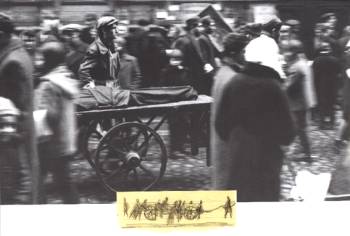 | ||||||||||
Samson
 fot: Renata Pajchel |
On first reading Kazimierz Brandys' novel Samson, I remembered the drawings by Gustave DorΘ I had seen as a child, and I started dreaming of making a modern film version of the great Biblical tale. What the novel demanded of a director, however, was simplicity, modesty and, above all, respect for details.
From the first day of shooting to the final day of editing, I remained torn between the two extremes. As veterans of Ashes and Diamonds both of us, Jerzy Wojcik and myself, realized the power of narrative shortcuts and the impact of symbolism on the screen. We wanted to continue in that direction. Brandys' novel, however, contradicted and desperately resisted our concepts.
Andrzej Wajda
Reviews
The audience is bored, preferring any foreign-made trash to an ambitious Polish film. They are right: what do they care about these ambitions, about "shots," "shortcuts," "frames," "sequences," "the Polish School," etc., when the director ignores all logic, truth and probability, distorts and invents facts and changes the visible world into a jigsaw puzzle with the sole purpose of showing off his inventiveness. (...) In Wajda's world everything is upsidedown, just like the figure of Christ in Ashes and Diamonds. Reality is but a set decoration. Wajda is only interested in photogenic faces, objects, facts and problems.
Whatever he does, the goal is always the same: to show off his talent. Which he undoubtedly has. Unfortunately, he also lacks taste and intellect to match it. If he is indeed master of a "school," then be damned to the school which teaches coquetry, vanity and irresponsibility.
Andrzej Kijowski
"Przeglad Kulturalny", Warsaw, 21 September, 1961
The critics of Samson have not overstrained their intellectual powers. Most reviews repeat a familiar set of accusations: false image of this and that, inadequacy of the character of Jacob, film's incapacity to carry the conceptual load, drama of the Ghetto still untouched, etc. No attempt has been made to discuss this new offer, so different from Wajda's previous works, in terms of creative, rather than propaganda merits, or the author's intentions and the values which the film contributes to our cinematography.
Konrad Eberhardt
"Film", Warsaw, September 1961
In its first part, the film is a masterpiece. Never before has Wajda revealed such virtuosity. He has not succumbed to the temptation of formal exercise. Far from any baroque mannerism, he says what he has to say firmly, even brutally, while using a minimum of effects, in shades nearly classical. This style present throughout the film reveals a great talent on the threshold of maturity.
Georges Sadoul
"Les Lettres Françaises", Paris, 1964
Oscar | Films | Theatre | Why Japan?
Favourites | Pictures gallery | About Wajda | Bibliography
Main Page | Search | Wersja polska
Copyright © 2000 Proszynski i S-ka SA. All rights reserved